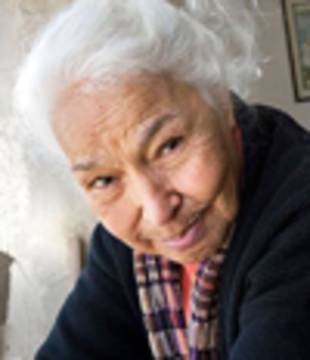
Renowned feminist and human rights activist Nawal El Saadawi was a political prisoner and exiled from Egypt for years. Now she has returned to Cairo and is participating in the protests in Tahrir Square. Amy Goodman reached El Saadawi on the telephone hours before Mubarak’s second address to the people of Egypt since protests began.
AMY GOODMAN: Nawal El Saadawi, how are you feeling right now?
NAWAL EL SAADAWI: Well, I am waiting for Mubarak to say that he is leaving, but some people said that he already left the country.
AMY GOODMAN: And what does that mean to you?
NAWAL EL SAADAWI: We will bring him back to be on trial, because he cannot go away, for three things. Number one, the corruption for 30 years. Number two, the massacre. Hundreds, hundreds and hundreds were killed, of young people. I was about to be knocked by a horse; I could have been dead. The young people took me away. The injured thousands of young people bleeding to death.
And, you know, all this, not only the corruption of 30 years, but the blood and the aggression — he was like Nero, to burn Rome: he was about to burn Cairo to stay in power. And also, because that he collected money, now the prosecutor, general prosecutor, and lawyers and judges are saying that he should be on trial, and his money should come back to Egypt, and the money of his men in the government and in the party. And now we know figures about his money. It’s horrible, but we are happy. We are happy. We will not leave him. He should be on trial. He cannot just escape.
AMY GOODMAN: Is it just him, Nawal El Saadawi? What about Omar Suleiman? How do you feel about the Vice President?
NAWAL EL SAADAWI: No, no, no, no! We don’t want Omar Suleiman or any man he appointed. Not Omar Suleiman, his deputy, or the Prime Minister. Nobody. The army now formed — you know, they will form a temporary just military council, temporarily. And then they give the power to us, to the people, to change the constitution to be a secular constitution, to change the laws, to make free elections, to have Egypt our Egypt, not the Egypt of the military and the businessmen.
AMY GOODMAN: How do you feel after this 30 years of dictatorship?
NAWAL EL SAADAWI: It’s not only these 30 years, because Mubarak was a continuation of Sadat. So, since 1970, I was in exile. I was oppressed. I was deprived of my human rights. And my books were banned. Our association was banned by Suzanne Mubarak. My history, my reputation was polluted by their lies and rumors.
I feel reborn. I am 80 years, but I feel I am 20. I feel happy that before I die I witness the revolution. I witness that justice, equality, the civil society, the secular Egypt. Women who slept in the square, mothers with children suckling, sleeping the night under the cold and the rain, sleeping for 17 days, until Mubarak now, we are going to listen to his going away. So I can’t tell you my feeling. I am reborn.
AMY GOODMAN: People in Tahrir Square right now are cheering, are shouting. There are stages set up. People are in front of the parliament. Doctors and lawyers and young people have marched.
NAWAL EL SAADAWI: Yes, millions! Millions of Egyptians in the streets. It’s a carnival! It’s a festival! People are congratulating each other, kissing each other. We were men and women in the square day and night, not a single harassment of any woman. Not a single church was burned. So it was Mubarak’s regime who was burning the churches and creating religious strife to divide Egypt and harassing women by his police. They released — the police of Mubarak released the criminals from prisons to shoot us and kill us and knock us down by horses and camels. So, I cannot tell you; it is beyond words.
AMY GOODMAN: And the role of the youth, Nawal?
NAWAL EL SAADAWI: The youth started, of course. The young women and men started, made the spark. But the whole of Egypt came — the working class, the Muslim Brothers, the communists, the socialists. Everybody came. The peasants! The peasants came from their fields, from the villages. So the young people made the spark, and then the whole of Egypt came.
AMY GOODMAN: And what about the thousands, hundreds, thousands — we don’t know how many have been detained. But, for example, like the blogger, Kareem Amer, who was already jailed for four years, has now disappeared from Sunday night with a friend. What will happen to them?
NAWAL EL SAADAWI: Kareem Amer, he was in my home, because Kareem Amer and some young people, men and women, they came to my home, and they formed what they called Nawal El Saadawi Forum, and we used to meet once every Wednesday, the first Wednesday of every month, in my home, discussing with Kareem Amer and other young people. He disappeared, but he will come tomorrow after the disappearance of Mubarak. So now we are having the disappearance of Mubarak and the reappearance of Kareem Amer and all his fellows.
AMY GOODMAN: And what did — would you say — what role that blogging, the bloggers, the dissidents, played in this revolution?
NAWAL EL SAADAWI: Well, they were saying what all people saying: that Mubarak should leave. At the beginning, the slogan of the revolution was Mubarak to leave. But after the bloody Wednesday of 2nd February, when hundreds were killed, and the horses, camels knocked people down, after this bloody Wednesday, we all shouted, “He should be on trial!” No, he should not leave, he should stay and be accountable for the blood and the corruption and the millions, millions of dollars with his family, with his wife. Suzanne Mubarak killed the feminist movements in Egypt. She was fighting me all the time. She banned our association. She tried to bury me and to bury any real feminist writer or a woman or a creative dissident person. So, now the slogan is to be on trial. He should not go. And if he goes, we’ll bring him back to be on trial for all these crimes and for the money, for the robbery, for making Egypt a poor country, 50 percent under the poverty line, with $2 a day. He should not just escape. No, no, no, no. There must be justice.
AMY GOODMAN: Nawal El Saadawi, will you be going to Tahrir Square?
NAWAL EL SAADAWI: I am going every day. Everybody in Tahrir Square — I come to my home to take a shower in the evening and then to reply to the media, like you.
AMY GOODMAN: What makes you confident that if a military council takes over, that they will ever let go of power? Why do you trust the military?
NAWAL EL SAADAWI: You know, the military was neutral. I trust only the people. I don’t trust the police. But the military in Egypt has some good history. And the military was very much delayed to take action. Why the military continued 17 days to act and to compel Mubarak to leave or to retire or to do something — why they were so late? Because, you know, the military is pragmatic, like Obama. So they were waiting until they see the power of the people, and they were hoping that we will go home because of the cold weather. It was very, very severe for us to stay the night. It was very cold. But people protected us with blankets, with everything. The protection of the people, to the people who slept in the square, was marvelous! So the military was waiting to see who will win. Those millions? They were hoping that we will be tired, and Mubarak was waiting. And that’s why he gained time. He was gaining time and giving us a bit, a bit concessions, you know, partial things like that, a piece of meat, like that, as if we are dogs, giving us a piece of meat. And they were waiting, the military waiting: who will win? And when we won the battle, the military stood with us. With us. Like Obama.
AMY GOODMAN: What about the role of labor?
NAWAL EL SAADAWI: The labor union?
AMY GOODMAN: The role of labor all over the country today striking?
NAWAL EL SAADAWI: The working class?
AMY GOODMAN: Yes.
NAWAL EL SAADAWI: Yes, they are with us. But the leaders — the leaders of the working class, what we call the labor union, they were betrayers, like the ministers, like the elite, the intellectuals of Egypt, the elite who sold their pants to Sadat and Mubarak, and they were against us. They called us dissidents, and they called us all bad names. The elite, the head of the Journalists’ Syndicate, the head of the Medical Syndicate, they were all working with Mubarak. All the intellectual leaders in Egypt, most of them, except the few dissident creative intellectuals and writers, who really continued to struggle. Sometimes we lost hope. Sometimes we had hope. We suffered. But for me, I was optimistic all the time. Hope is power. And also, to the young people who came to me, including Kareem Amer and the others, I told them Mubarak will fall. Exactly as when I was in prison under Sadat, I told them Sadat will fall, and we will come out. And that’s happened. I told them Mubarak will fall, and we will live. It is the power of the people.
AMY GOODMAN: Well, Nawal El Saadawi, thank you so much for being with us. Now, let me ask you: are you 79 years old or 80?
NAWAL EL SAADAWI: I am between 79 and 80.
AMY GOODMAN: Your birthday is in October?
NAWAL EL SAADAWI: Yes.
AMY GOODMAN: You’re in your 80th year.
NAWAL EL SAADAWI: Yes, 27 October, 1931. Now I am 80 or — I don’t know — or 79. I don’t know.
AMY GOODMAN: What will you do in a liberated Egypt?
NAWAL EL SAADAWI: I will be a writer. Young people — I’ll tell you something very interesting, Amy. When I went to the square on the 25 and 6th and 7th, all the days, I was surrounded by young men and women. Even Muslim Brothers hugged me. And you know what did they say? They said, “Your books inspired us. It made us rebelling and creative and dissident.” And you see what the young Muslim Brothers told me: “You know, Dr. Nawal, we disagree with some of your work, with some of your ideas, but we respect you and love you.” And they hugged me, you know? And Christians and Muslims were praying together. Men and women were lying under tents together. No, they don’t know each other. No harassment. Women gave birth to children under the tent. Girls married men under the tent. It was like a new city. So Tahrir Square became a new city, with new marriages, new love affairs, Christians hugging Muslims. It was — you know, the revolution cleaned all the conflicts, whether religious or sexual. The revolution cleansed all the conflicts created by Sadat and Mubarak regime.
AMY GOODMAN: It is now being reported that the Egyptian military has stepped in to safeguard the country. Your response to that?
NAWAL EL SAADAWI: Well, they were delayed. They should have done that second day or third or fourth, not after 17 days. So, they were delayed, because, as I told you, they were measuring powers. But at last they stepped in, because the country was paralyzed. Egypt — everybody in the street, so the country will collapse. So they said, either the country to be burned and collapse, and they couldn’t afford that they sacrifice the whole of Egypt for one person, Mubarak, though he is the son of the military. But they said it’s better to sacrifice one person rather than to sacrifice the whole country. And it was something that they should do, and they did it.
AMY GOODMAN: And what do you say to the women of Egypt, Nawal El Saadawi?
NAWAL EL SAADAWI: Well, I tell them now we will have secular Egypt, secular constitution. Now Suzanne Mubarak will be out, because she banned all our associations. She banned our Egyptian women union. So now we’ll have a real feminist movement, and we’ll go ahead, because we women, we are more than half the society, and we have to supervise the revolution so that they will not take our rights, as happened in the Algerian revolution or Egyptian revolution before. We know from history that women participate in revolutions, and then they are — their rights are not recognized, or they are ignored. So, we will have our union. We will have our collective power to supervise the new government in order that women are totally equal to men — morally, socially, economically, politically, intellectually — complete equality between men and women, complete equality between Christians and Muslims. We must have a new family code to abolish polygamy and the domination of men in the family. We must have a secular, unified family code for Christians and Muslims, and based on equality, because now we have a family code for Christians and a family code for Muslims. And we have a very bad family code. One of the most backward family codes in the Arab world is the Egyptian one. Tunisia abolished polygamy, but Egypt did not. So, we will supervise our rights by our collective power. So we will have the Egyptian women’s union, which was banned by Suzanne Mubarak.
AMY GOODMAN: And a message to a place you’ve traveled many times in your exile, and that is, to the United States? Your feelings today about the role the United States should play and has played in these last decades, supporting the dictatorship in Egypt?
NAWAL EL SAADAWI: Yes, I think the U.S. government, like the British — we were — I was born under King Farouk. I am now, as I — and we demonstrated against King Farouk when I was in primary school and in secondary and in the medical faculty. And then we demonstrated against Nasser after the defeat, the big defeat of 1967, and the corruption of the army. And then we demonstrated against Sadat, demonstrated against Mubarak. It’s a continuous, continuous battle. And we will not stop. We will not stop, because it’s not enough to make the revolution, we have to protect it. We have — what was your question at the beginning?
AMY GOODMAN: I asked you about the role of the United States in —
NAWAL EL SAADAWI: Ah, the United States supported dictatorship in Saudi Arabia, in the Arab world, in Egypt. They supported Sadat, and capitalism and imperialism and corruption. The U.S. government supported Israel 100 percent. Obama came to Cairo, and he said, “We support Israel 100 percent.” And Israel was killing the Palestinians, and he said so. So, the U.S. government take care about her own interest. Obama is pragmatic, and he was working for his country. And not all — I don’t like his policy, because he’s pragmatic and capitalist, and I am a feminist socialist. I am against class oppression and discrimination. I am against imperialism. I am against patriarchy. I am against racism, and all that. So I disagreed.
And I was censored in the United States. Amy Goodman, you are the only one who really interviewed me when I came to New York some years ago. Now I have many, many people interviewing me in many countries, because we won now, because we won. But when I was defeated, it was you, Democracy Now!, who really, really supported us and interviewed us and made our voice be heard in U.S. I was censored by the CNN, I was censored by the New York Times, because I was speaking against the U.S. government. So, we are all in the same boat, and we should get rid of patriarchy and class oppression and racism under any name, and to separate between religion and state, to have real, real secularism, because, from my years in U.S., the United States government is a Christian-Jewish fundamentalist state, and I lived in Atlanta, in the Bible Belt, two years, and can you imagine? Then in Missouri state. It’s called Missouri?
AMY GOODMAN: Yes.
NAWAL EL SAADAWI: Yes. The president of the university did not — confiscated my contract with the dean, because he heard me speaking against George Bush. So there is no democracy in many of the universities in U.S., no democracy in U.S., because it’s a capitalist, patriarchal system. And the Bible Belt is — you know the Bible Belt and how the Christian-Jewish fundamentalist groups dominate the economy. And they dominated even Mubarak — Obama — I make this, now I am so tired — because Obama flattered the Christian, Jewish groups to win the elections. I was in Atlanta listening to him.
So, what I would like to say: we are all in the same boat, men and women, in this jungle. Jungle. George Bush killed the Iraqis, invaded Iraq for the oil. Israel is killing the Palestinians and the Gaza people ’til today, ’til yesterday. And, you know, the so-called U.N., the United Nations, we call it the United Nations of America. And we don’t have an international body that defends the people. We don’t have it. So we need to create a new U.N., a new International Criminal Court, because nobody is really defending the poor and the women and the oppressed.
AMY GOODMAN: Well, Nawal El Saadawi, thank you so much for talking to us.


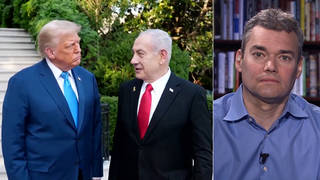
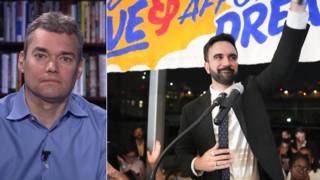
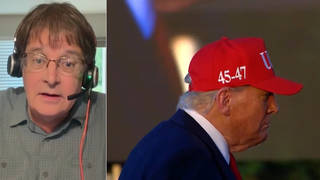





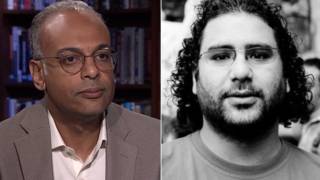

Media Options